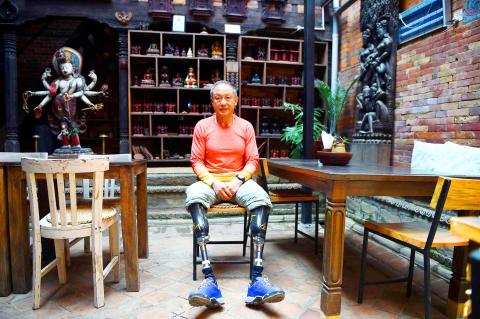Chinese climber Xia Boyu (夏伯渝), who lost both legs to frostbite on Everest four decades ago, is hoping to finally reach the summit, after Nepal’s top court overruled a controversial government ban on blind and double amputee climbers.
Xia is the first double amputee to be given a permit to climb the world’s highest mountain after the ban was revoked.
The 69-year-old said the measure, introduced in December to much criticism, was “discriminating against the disabled.”

Photo: AFP
“I panicked after I heard the news, because it meant that I could not fulfil my dream,” Xia told reporters. “I thought: ‘How can I now get a climbing permit?’”
However, last month, disability advocacy groups successfully overturned the ban in Nepal’s highest court, arguing it contravened the UN convention on the rights of people with disabilities.
Xia’s bid to summit the 8,848m mountain will be his fifth. He was part of a Chinese national team in 1975 when the group encountered bad weather just below the summit. Oxygen-starved and exposed to frigid temperatures, Xia suffered severe frostbite and lost both his feet.
In 1996, his legs were amputated just below the knee, after he was diagnosed with lymphoma, a form of blood cancer. The tenacious climber returned to Everest in 2014, but an avalanche killed 16 Sherpa guides early in the season, forcing most expeditions to call off their summit bids.
Xia was back the following year, but the climbing season was again cut short when a powerful earthquake struck Nepal, killing about 9,000 people — including 22 on Everest. His last attempt was in 2016, when bad weather again forced him to turn back just 200m from the summit.
“Climbing Mount Everest is my dream. I have to realise it. It also represents a personal challenge, a challenge of fate,” Xia said.
Xia’s guide, Dawa Gyalje Sherpa — who has summited Everest eight times — is hopeful that the plucky Chinese climber will finally make it to the top this time.
“He has been training and has climbed above 8,000m before,” Sherpa said. “I am hopeful he will fulfil his dream.”
The legal wrangling over disabled climbers did scupper ex-soldier Hari Budha Magar’s bid to become the first above-the-knee double amputee to scale Everest.
Magar — a 38-year-old former Gurkha soldier who lost both of his legs in Afghanistan — postponed his attempt and said he would return in 2019.
The only double amputee to have summited Everest is New Zealander Mark Inglis, who achieved the feat in 2006.
Hundreds of climbers flock to Everest every year during the brief spring climbing season starting April, when winds and temperatures are more forgiving than other times of the year. Last year, 634 people made it to the top and seven died trying.
Nepalese and Chinese authorities, who monitor all climbs on the southern and northern faces of the mountain respectively, are yet to release the number of climbing permits issued for this year, but the season — which marks the 65th anniversary of the first summit of Everest by Edmund Hillary and Tenzing Norgay — is expected to be busy.

POLITICAL PRISONERS VS DEPORTEES: Venezuela’s prosecutor’s office slammed the call by El Salvador’s leader, accusing him of crimes against humanity Salvadoran President Nayib Bukele on Sunday proposed carrying out a prisoner swap with Venezuela, suggesting he would exchange Venezuelan deportees from the US his government has kept imprisoned for what he called “political prisoners” in Venezuela. In a post on X, directed at Venezuelan President Nicolas Maduro, Bukele listed off a number of family members of high-level opposition figures in Venezuela, journalists and activists detained during the South American government’s electoral crackdown last year. “The only reason they are imprisoned is for having opposed you and your electoral fraud,” he wrote to Maduro. “However, I want to propose a humanitarian agreement that

ECONOMIC WORRIES: The ruling PAP faces voters amid concerns that the city-state faces the possibility of a recession and job losses amid Washington’s tariffs Singapore yesterday finalized contestants for its general election on Saturday next week, with the ruling People’s Action Party (PAP) fielding 32 new candidates in the biggest refresh of the party that has ruled the city-state since independence in 1965. The move follows a pledge by Singaporean Prime Minister Lawrence Wong (黃循財), who took office last year and assumed the PAP leadership, to “bring in new blood, new ideas and new energy” to steer the country of 6 million people. His latest shake-up beats that of predecessors Lee Hsien Loong (李顯龍) and Goh Chok Tong (吳作棟), who replaced 24 and 11 politicians respectively

Young women standing idly around a park in Tokyo’s west suggest that a giant statue of Godzilla is not the only attraction for a record number of foreign tourists. Their faces lit by the cold glow of their phones, the women lining Okubo Park are evidence that sex tourism has developed as a dark flipside to the bustling Kabukicho nightlife district. Increasing numbers of foreign men are flocking to the area after seeing videos on social media. One of the women said that the area near Kabukicho, where Godzilla rumbles and belches smoke atop a cinema, has become a “real

‘WATER WARFARE’: A Pakistani official called India’s suspension of a 65-year-old treaty on the sharing of waters from the Indus River ‘a cowardly, illegal move’ Pakistan yesterday canceled visas for Indian nationals, closed its airspace for all Indian-owned or operated airlines, and suspended all trade with India, including to and from any third country. The retaliatory measures follow India’s decision to suspend visas for Pakistani nationals in the aftermath of a deadly attack by shooters in Kashmir that killed 26 people, mostly tourists. The rare attack on civilians shocked and outraged India and prompted calls for action against their country’s archenemy, Pakistan. New Delhi did not publicly produce evidence connecting the attack to its neighbor, but said it had “cross-border” links to Pakistan. Pakistan denied any connection to